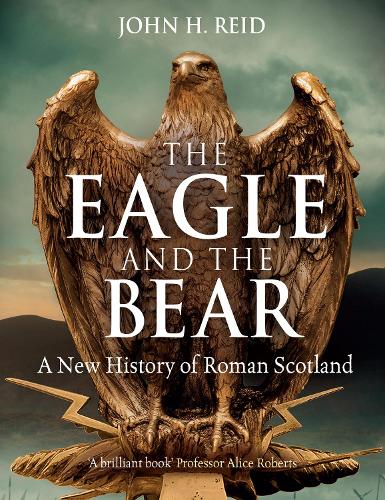
The Eagle and the Bear: A New History of Roman Scotland
(Paperback)
Publishing Details
The Eagle and the Bear: A New History of Roman Scotland
By (Author) John H. Reid
Birlinn General
Birlinn Ltd
1st August 2023
6th April 2023
United Kingdom
Classifications
General
Non Fiction
History
Archaeology
European history
Social and cultural history
Ancient history
936.1103
Physical Properties
Paperback
256
Width 189mm, Height 246mm, Spine 18mm
732g
Description
For over three centuries, the inhabitants of North Britain faced the might of Rome, resulting in some of the most extraordinary archaeology of the ancient world.
Drawing on his on his extensive experience, John H. Reid considers many of the controversies surrounding Roman Scotland, several of which remain points of lively debate. From a reassessment of the loss of the Ninth Legion and the reasons for building and maintaining Hadrians Wall, to considering what spurred at least four Roman Emperors to personally visit the edge of the Empire, he offers an informed view of what it was like to be at the dark heart of imperialism and slavery, and to be on the receiving end of Romes merciless killing machine.
Reviews
'Superbly researched, accessibly written and thoughtfully and convincingly argued, this book presents a chronological history of the Romans in Scotland'
-- Ken Lussey * Undiscovered Scotland *'A new detailed history of Roman Scotland, offer[ing] an opportunity to re-examine the legend'
* West Highland Free Press *'[a] comprehensive, accessible, and thought-provoking study'
* Scotland on Sunday *'offers thought-provoking re-assessments of the loss of the IXth Legion, the reasons for building Hadrian's Wall, and why at least four Roman emperors personally visited the edge of the empire'
* Southern Reporter *Author Bio
John Reid has had a lifelong fascination with Roman Scotland. He co-directed the Burnswark Project in Dumfriesshire, the ground-breaking archaeological dig of the only known Roman siege in Britain and has been Chairman of the Trimontium Trust in Melrose for the last 25 years. He has appeared on on BBC TV and radio and is a regular speaker at major archaeological conferences and has been published widely in the academic and popular press.
